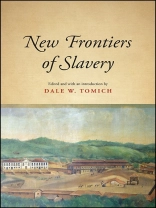The essays presented in
New Frontiers of Slavery represent new analytical and interpretive approaches to the crisis of Atlantic slavery during the nineteenth century. By treating slavery within the framework of the modern world economy, they call attention to new zones of slave production that were formed as part of processes of global economic and political restructuring. Chapters by a group of international historians, economists, and sociologists examine both the global dynamics of the new slavery, and various aspects of economy-society and master-slave relations in the new zones. They emphasize the ways in which certain slave regimes, particularly in Cuba and Brazil, were formed as specific local responses to global processes, industrialization, urbanization, market integration, the formation of national states, and the emergence of liberal ideologies and institutions. These essays thus challenge conventional understandings of slavery, which often regard it as incompatible with modernity.
This book is freely available in an open access edition thanks to Knowledge Unlatched – an initiative that provides libraries and institutions with a centralized platform to support OA collections and from leading publishing houses and OA initiatives. Learn more at the Knowledge Unlatched website at:
https://www.knowledgeunlatched.org/, and access the book online at the SUNY Open Access Repository at
http://hdl.handle.net/20.500.12648/1707.
İçerik tablosu
List of Tables
Introduction
Dale W. Tomich
Vassouras Yesterday and Today: Revisiting the Work of Stanley J. Stein
Dale W. Tomich
Agency and Transnational Perspectives on the Constitution of Waged, Unfree, and Free Labor: The Role of Mobility in the Nineteenth Century
Yann Moulier Boutang
The Discovery of Progress in Cuba: Machines, Slaves, Businesses
José Antonio Piqueras
Antislavery and Nationalism on the Two Sides of the Atlantic: In Search of Forgotten Links between the Nineteenth-Century Americas and Europe
Enrico Dal Lago
African Labor in Guyana and the Expansion of the Second Slavery
Wazir Mohamed
On the Blurred Boundaries of Freedom: Liberated Africans in Cuba, 18171870
Inés Roldán de Montaud
Plantation Laboratories: Industrial Experiments in the Cuban Sugar Mill, 18301860
Daniel Rood
Slavery, Frontier, and Diplomatic Relations: Brazil-Uruguay, 18401860
Keila Grinberg &
Rachel Caé
Ruling the Household: Masters and Domestic Slaves in the Paraíba Valley, Brazil, during the Nineteenth Century
Mariana Muaze
French Travelers and Journalists Debate the
Lei do Ventre Livre of 1871
Claudia Santos
List of Contributors
Index
Yazar hakkında
Dale W. Tomich is Deputy Director of the Fernand Braudel Center for the Study of Economies, Historical Systems, and Civilizations, and Professor of Sociology and History at Binghamton University, State University of New York. He is the author of
Through the Prism of Slavery: Labor, Capital, and World Economy.












